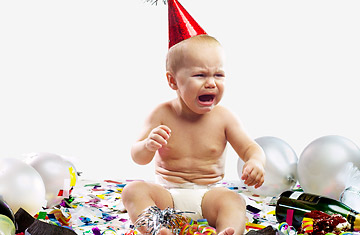
At exactly two minutes after midnight on Jan. 1, 2000, an alarm sounded at a nuclear power plant in Onagawa, Japan. Government officials and computer scientists around the globe held their breath. Was this the beginning of a massive Y2K computer meltdown? Actually, no. It was an isolated event, one of a handful of glitches to occur (including the failure of 500 slot machines at two racetracks in Delaware) as the sun rose on the new decade. The dreaded millennial meltdown never happened.
Instead, it was the American Dream that was about to dim. Bookended by 9/11 at the start and a financial wipeout at the end, the first 10 years of this century will very likely go down as the most dispiriting and disillusioning decade Americans have lived through in the post--World War II era. We're still weeks away from the end of '09, but it's not too early to pass judgment. Call it the Decade from Hell, or the Reckoning, or the Decade of Broken Dreams, or the Lost Decade. Call it whatever you want--just give thanks that it is nearly over.
Calling the 2000s "the worst" may seem an overwrought label in a decade in which we fought no major wars, in historical terms. It is a sadly appropriate term for the families of the thousands of 9/11 victims and soldiers and others killed in Iraq and Afghanistan. But the lack of a large-scale armed conflict makes these past 10 years stand out that much more. This decade was as awful as any peacetime decade in the nation's entire history. Between the West's ongoing struggle against radical Islam and our recent near-death economic experience--trends that have largely skirted much of the developing world--it's no wonder we feel as if we've been through a 10-year gauntlet. Americans may have the darkest view of recent history, since it's in the U.S. that the effects of those trends have been most acute. If you live in Brazil or China, you have had a pretty good decade economically. Once, we were the sunniest and most optimistic of nations. No longer.
The U.S. has endured not one but two market crashes--one at each end of the decade. You might recall the first Wall Street crash, when swooning tech stocks tanked the market from 2000 to 2001, not long after the Nasdaq hit an all-time high of 5049 on March 10, 2000. (Recent levels: 2150-2200.) The economy went into a recession that now seems laughably mild. What followed wasn't funny at all: the most divisive and confusing presidential election in history, a discombobulated drama that we once thought could occur only in the Third World.
Then came the defining moment of the decade, the terrorist attacks of 9/11, which redefined global politics for at least a generation and caused us to question the continental security we had until then rarely worried about. We waged war in Afghanistan that drags on and today is deadlier than ever. Then came our fiasco in Iraq. Don't forget the anthrax letters and later the Washington, D.C., snipers and the wave of Wall Street scandals highlighted by Enron and WorldCom.
Sometimes it was as if the gods themselves were conspiring against this decade. On Aug. 29, 2005, near the center point in the decade, Hurricane Katrina made landfall in southeast Louisiana, killing more than 1,500 and causing $100 billion in damages. It was the largest natural disaster in our nation's history.
